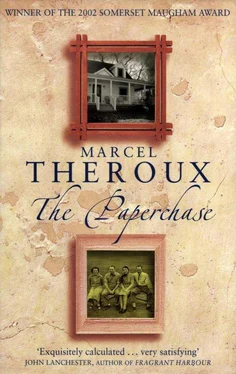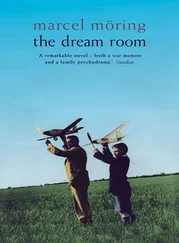Now that I was able to leave the house behind, I realised that the solitude had been a purgative. My old life had died with Patrick. And the dusty, isolated, frugal legacy he had left me actually affirmed its opposite. I felt grateful to Patrick. I was Scrooge, waking up on Christmas morning after the third visitation, having finally grasped the message that the dead bring to all the living — that there’s still time. Patrick was my Ghost of Christmas Future. I felt grateful to him for being my unwitting angel.
I lay down on the grass and looked at the sky, and by a strange reversal, it seemed to be below me, like an ocean of stars, fading away in its depths to blackness. Around me, the island seemed to be breathing in time with the sea. Then I realised it was my own breath, respiring as the waves broke and withdrew.
Going back into the house to refill my glass for the second or third time, I remembered the box files. They were stacked where we had left them in the library. I carried four of them up to my bedroom to open them.
The first one contained letters, but there were fewer than I had expected. I threw them into the air — a sheaf of yellow pages covered with round, childish handwriting spilled over the floor.
Because I’d seen his handwriting so recently, I got it into my head that the author of the letters was Nathan Fernshaw, and I wondered why he had written to Patrick in such detail. I picked up a couple of leaves from the floor. The first lines I read had the felicitous spelling mistakes of a young child: ‘my friend raymond was unconshase’; a second page was written by a self-conscious adolescent wiseacre: ‘Dear Patrick, I just wanted to write a letter that doesn’t begin, “How are you?” — oops — it managed to sneak in anyway …’ A third page was somewhere in between:
‘it is the end of my holiday and it is halloween. we are going for a midnight walk with dad and we will bring our scooters and vivian’s go cart we hope we are thought to be ghosts and suspicions are arosed about ghosts walking across the common but we will no who they were but if real ghosts did walk across the common brrr.’
And now there was a flash of recognition — or flashes that froze instants of the distant past. My widowed father pushing Vivian along a path on Wandsworth Common. The great orange lights of Trinity Road pushing back the blackness. A ‘midnight’ walk that took place at 8 p.m. The first anniversary of my mother’s death. I knew instantly what would be at the foot of this page, and the previous page, and every other page in the box. Love Damien.
I opened the other box files, thinking I might find more of my own letters, or Vivian’s, or letters from my father. One box contained yellowing royalty statements for Peanut Gatherers. The others held a miscellany of unconnected papers: receipts, invoices for some gardening work, an old copy of Boston magazine with an article about Patrick’s writing classes for the prisoners, and a coffee-stained manual for the computer in the dining room.
I gathered my own letters into a thin sheaf and lay in bed poring over them. They were embarrassing reading, as only your own letters can be. I had sent my uncle an exhaustive explanation of the rules of conkers with diagrams; various thank-you letters; two pieces of correspondence written from boarding school in consecutive late Octobers full of nostalgia for summer barbecues and Bolder than Mandingo. By a weird symmetry, the mild Ionian night that I said I missed in my letters hung thickly over the window of my bedroom, where I lay, more than twenty years later, reading my own handwriting. I felt able to recognise, at that moment, what my teenage self, cooped up in the oppressive male atmosphere of a boys’ boarding school, couldn’t or wouldn’t remember: that those summers had been full of longueurs, that we had had no friends, that there was a loneliness intrinsic to time spent with my family. And I remembered too that each holiday contained a moment of recognition when I realised I ached with boredom and solitude, and that Stevo was having a better time working in his dad’s sportswear shop in Kentish Town.
I had to go back downstairs to get the other boxes. It was past midnight. It had begun to rain and clouds had extinguished the starlight. Inside the house, the darkness was so deep it seemed to have a texture — the restless, electric quality you find on the inside of your eyelids.
The first box was empty, and my disappointment deepened when I found the second also contained nothing. I wondered if Mrs Delamitri had been telling the truth when she said she had respected Patrick’s privacy. The third held a collection of auction catalogues. But in the fourth, concealed under several sheets of blank paper, was a typescript with the same quirky lettering as the inventory.
I pulled back the wire trap that held the typescript flat in the bottom of the box. There were close to a hundred pages, loosely fastened through a hole in the top left-hand corner by a piece of cord with a metal stay at each end. The first page was blank, the second was a title page. A single row of capital letters across the middle of it read: THE CONFESSIONS OF MYCROFT HOLMES
THE NAME ALONE was like a spark igniting a gunpowder trail of associations in my brain. Mycroft is Sherlock’s older brother. That’s a fact — a fictional fact, in the sense that Arthur Conan Doyle invented him, rather than Patrick. Mycroft is mentioned in only a handful of Doyle’s stories and there’s something troubling about his absence.
Nothing really explains Mycroft. He’s superfluous to the stories. That’s what’s so interesting about him. He’s not created for a reason, he doesn’t have a function in the plot. He’s there because he’s there, vivid and unnecessary — like all the best things. He’s extra, the imagination’s tip to the reader.
And as fictional characters go, there is less of him than most. After all, what is a character in a book? Four facts, a speech impediment, boss-eyes, a fluffy moustache from a box of costumes. Mycroft is empty. But it’s a pregnant emptiness. And Patrick had seen something moving there, something that reminded him of himself.
Doyle portrays Mycroft as an indolent genius, with more natural aptitude than his younger brother, but without the drive to achieve anything with it. The first time he meets Watson (in ‘The Greek Interpreter’) he astonishes him by out-deducing Sherlock. In ‘The Bruce Partington Plans’, we learn that Mycroft plays a significant role in the British government of the time. Sherlock calls him ‘the most indispensable man in the country’. The only other things about Mycroft that are certain are that he is very fat, and a member of the Diogenes Club, where conversation is forbidden.
Sherlock Holmes trivia was one of Patrick’s minor enthusiasms. Vivian and I didn’t share it to the extent of actually reading the stories, but we were able to participate in Patrick’s quizzes because, like his anecdotes and riddles, the questions were the same every year: ‘What was the curious incident of the dog in the night-time?’ (The dog didn’t bark, that was the curious incident); ‘In which story does Holmes say, “Elementary, my dear Watson”?’ (He never says it); and, of course, ‘What is the name of Sherlock’s smarter older brother?’
Patrick had mentioned Mycroft in one other place. In a footnote to Amazon Basin (the unplagiarised section) he calls him one of literature’s three most intriguing absences. The other two are Yorick — the fool who’s dead before Hamlet begins — and camels from the Koran. Patrick maintained that if God had indeed written the Koran, He would have remembered to put in the camels.
Читать дальше












